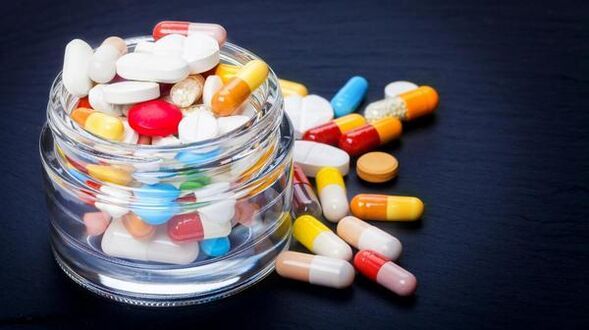
In the article, we have collected all the drugs for prostatitis that doctors prescribe for the treatment of acute and chronic inflammation of the prostate. You will learn what effect they have, how to take them, how much they cost and what side effects to worry about.
What drugs are used to treat prostatitis
The treatment of prostatitis is based on antibiotics and anti-inflammatories. As an auxiliary therapy, immunomodulators, agents for improving metabolic processes in the gland, antispasmodics are prescribed. Below, we'll take a closer look at each group.
Antibacterial
Antibiotics are necessary to treat bacterial prostatitis in order to quickly clear the infection of the prostate to avoid complications: migration of pathogens to the testicles, transition of inflammation to a chronic form, development of aprostate abscess and urosepsis.
Medicines are selected based on test results, but until the culture is ready, broad-spectrum antibiotics are prescribed. The most common pathogens are Escherichia coli, Enterococcus faecalis, staphylococci, ureaplasma, chlamydia. They can only be eliminated with the help of antibiotics, which can penetrate the tissues of the gland and accumulate there for a long time. These properties are possessed by fluoroquinolones. These drugs are valuable in that they are able to penetrate the protective barriers synthesized by ureaplasma. Tetracyclines are effective against chlamydia, rods, staphylococci. With trichomonal prostatitis, drugs based on metronidazole, an antiprotozoal substance, are prescribed.
Sometimes drugs are injected directly into the prostate. This is called lymphotropic therapy.
Antifungal
Fungal prostatitis is rare. Antifungal drugs for prostate inflammation are usually prescribed as a prophylaxis for candidiasis. After a course of antibiotics, immunity decreases and active reproduction of the fungus occurs, candidal balanitis and balanoposthitis may develop.
Anti-inflammatory
Nonsteroidal anti-inflammatory drugs (NSAIDs) are prescribed for acute prostatitis and chronic recurrences. The pain of an inflamed prostate gives to the lower back, legs and rectum. Nonsteroidal anti-inflammatory drugs block the release of substances causing inflammation. To avoid side effects from the gastrointestinal tract, with exacerbation of prostatitis, drugs are prescribed in the form of suppositories. Medicines are cheap, but cannot be used for a long time.
Antispasmodics
The inflamed prostate swells and compresses the urethra, which makes urination difficult, the pain causes muscle spasms. Antispasmodics relax the smooth muscle fibers of the prostate, urethra, bladder neck, facilitating urination and bowel movements. These drugs with mild inflammation can replace nonsteroidal anti-inflammatory drugs. In particular, the substance drotaverine is often included in preparations and has no side effects.
Alpha blockers
The action of alpha-adenoblockers is similar to that of antispasmodics, but much more pronounced. They are also prescribed in case of bad urination. These drugs significantly reduce the tone of the prostate gland, bladder walls and neck. The stream of urine becomes confident, does not stop, the bladder is completely emptied. Alpha-blockers help to avoid the accumulation of residual urine, in which bacteria actively multiply, and pathological changes in the walls of the bladder. A common side effect of these drugs is retrograde ejaculation.
Painkillers
The function of pain relief for prostatitis is successfully performed by nonsteroidal anti-inflammatory drugs, but in case of failure, painkillers are prescribed in injections.
Diuretic
Diuretic drugs for prostatitis are needed to wash out the urinary tract, remove excess fluid and relieve swelling of the gland. Chemical agents such as furosemide are rarely prescribed so as not to cause an imbalance in the sodium balance. Most doctors prefer herbal preparations.
sedatives
Soothing, more precisely, antidepressants, in chronic prostatitis, are necessary to alleviate the symptoms of neurosis and depression caused by constant pain, the inability to empty the bladder normally. Doctors often prescribe SSRIs, but they worsen erectile function.
enzymes
Enzyme preparations of animal and plant origin dilute prostatic secretion, facilitating the drainage of glandular ducts, have an analgesic and immunomodulating effect. The most effective method of administration is intramuscular injection.
Immunomodulators
Chronic prostatitis reduces the local immunity of the prostate, respectively, it is necessary to increase it in the first place. In this sense, preparations based on bovine prostatic peptides are effective. They restore metabolic processes in the gland, stimulate the activity of the secretory epithelium. The normal secret has antibacterial properties, which also helps relieve inflammation. The optimal form of preparations is in the form of candles.
Urologists often prescribe interferon inducers as immunomodulatory therapy. Immunologists warn that such interference with the immune system should only be targeted after an immunogram. The doctor must first determine in which connection the failure lies and whether it exists.
food supplements
For the treatment and prevention of prostatitis, dietary supplements are prescribed on a natural basis. It is mainly an extract of the sabal palm, it is also creeping serenoia. Active substances block enzymes that cause inflammation and swelling, strengthen blood vessels, improve blood circulation in the pelvic region. With a course of taking the drug, the process of urination is facilitated.
Conclusion
Remember:
- Prostatitis is a multifactorial disease, therefore it is treated with a complex of drugs.
- Before the diagnosis, you can not drink antibiotics and uroseptics, so as not to distort the result.
- In online pharmacies, many drugs are much cheaper than in conventional pharmacies.






















